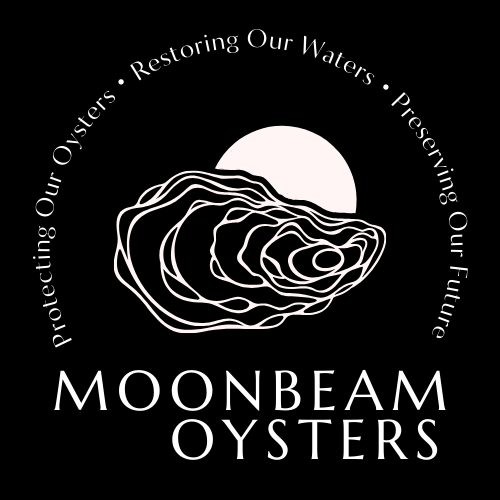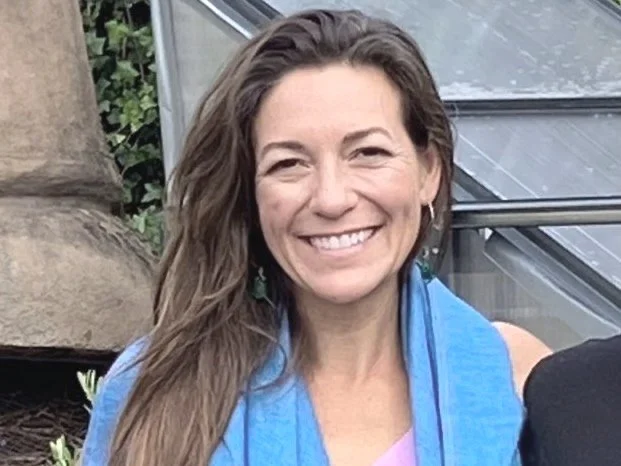MOONBEAM OYSTERS
Protecting Our Oysters・Restoring Our Waters・Preserving Our Future
Our Mission.
Moonbeam Oysters promotes environmental stewardship through the cultivation and support of oyster habitats. By offering services such as non-consumptive oyster cultivation, habitat structure development, and installation, Moonbeam Oysters aims to foster sustainable practices that contribute to the restoration of oyster populations and to the overall health of marine ecosystems in the Chesapeake Bay.
Our Vision.
We envision a vibrant Chesapeake Bay ecosystem where waterfront property owners are actively involved in sustainable oyster habitat restoration. The environmental stewardship we support will cultivate a resilient marine environment that enhances biodiversity, bolsters the Bay's ecological health, and preserves this natural resource for generations to come.
Key Objectives:
Reintroduction of Natural Oyster Larvae: MBO seeks to enhance natural spawning and rejuvenate wild oyster populations.
Habitat Development: MBO creates both sinking and floating cages for adult oysters to provide essential support for oyster growth and survival.
Partnerships for Mitigation: MBO aims to collaborate with private, public, and funding sources to effectively implement these initiatives.
Services Offered:
Oyster Cultivation: Focus on non-consumptive practices that promote local biodiversity.
Habitat Structure Development: Design and construct various habitats to support oyster growth.
Transportation and Installation: Ensure safe delivery and setup of habitat structures in desired locations.
Ongoing Maintenance: Provide regular care and monitoring to ensure the health and sustainability of oyster habitats.


The Science Behind MBO
Oysters are crucial to both marine ecosystems and human coastal communities. A keystone species essential for maintaining the balance of marine ecosystems, oysters’ ecological, economic, and cultural significance underscores the importance of conservation efforts aimed at restoring and protecting oyster habitats, particularly in vital areas like the Chesapeake Bay. By enhancing oyster populations, we contribute to healthier waterways, thriving marine life, and resilient coastal communities.
-
Oysters are natural filter feeders, capable of filtering large volumes of water. A single oyster can filter up to 50 gallons of water per day, removing pollutants, excess nutrients, and suspended particles. This filtration helps improve water quality, clarity, and overall health of the marine environment.
-
Oysters contribute to the formation of reefs, which provide essential habitat for a variety of marine species, including fish, crabs, and other invertebrates. These reefs serve as breeding and nursery grounds, promoting biodiversity and supporting healthy ecosystems.
-
Oyster reefs help stabilize shorelines by reducing wave energy and preventing coastal erosion. This not only protects valuable habitats but also safeguards coastal infrastructure and neighborhoods from the impacts of storm surges and rising sea levels.
-
Oysters play a role in carbon sequestration, as the shell material they produce is composed mainly of calcium carbonate. This process helps mitigate climate change by capturing carbon dioxide from the atmosphere and storing it in marine sediments.
-
The health of oyster populations can serve as an indicator of overall marine ecosystem health. Declines in oyster populations can signal issues such as pollution, habitat degradation, or climate change, making them valuable for environmental monitoring.

The Pathway to Cleaner Water.
-
Objective: Meet with property owners to understand their goals, concerns, and the specific characteristics of their waterfront property.
Activities: Discuss potential environmental benefits, regulatory considerations, and project feasibility.
-
Objective: Conduct a thorough evaluation of the property to determine its suitability for oyster habitat restoration.
Activities: Analyze water quality, substrate conditions, tidal influences, and existing marine life.
-
Objective: Create a tailored restoration plan that addresses the needs of the property owner while aligning with conservation goals.
Activities: Develop a detailed proposal that includes project design, timeline, and objectives for oyster habitat growth.
-
Objective: Carry out the installation of the oyster habitats as outlined in the restoration plan.
Activities:
Grow oysters for non-consumptive purposes in a controlled environment.
Design and manufacture habitat structures (e.g., reef balls, cages).
Transport and install these structures at the designated site.
-
Objective: Ensure the ongoing health and effectiveness of the oyster habitats.
Activities:
Conduct regular assessments to monitor growth and ecosystem impacts.
Provide maintenance services to ensure habitat integrity and promote oyster sustainability.
-
Objective: Measure the success of the restoration project and provide feedback to stakeholders.
Activities: Prepare reports detailing ecological outcomes, lessons learned, and recommendations for future projects, while sharing success stories with the broader community.
-
Objective: Involve the local community and stakeholders to raise awareness and support for the project.
Activities: Organize informational sessions, workshops, and volunteer opportunities to educate about oyster habitats and their ecological benefits.
-
Objective: Foster ongoing relationships with property owners and the community for future restoration efforts.
Activities: Maintain communication to encourage continued environmental stewardship and explore opportunities for further collaboration.
Join Us for a Cleaner Chesapeake Bay.
-

Bring Oysters Home
Play an active role in conservation while enhancing the health of your own shoreline by partnering with MBO to develop sustainable oyster habitats.
-

Donate
Help us in our efforts to cultivate oysters, construct and maintain oyster habitat, and create educational programs. Help us clean the Bay.
-

Corporate Partnerships
Collaborate with MBO to enhance your corporate social responsibility initiatives and engage your employees, all while contributing to meaningful conservation efforts.
-

Volunteer
Join us in hands-on restoration activities! Your time and effort will make a tangible difference in our restoration projects and help promote a culture of environmental stewardship.
The Faces of MBO
We started Moonbeam Oysters with one goal in mind: clean water, happy oysters, and a thriving Chesapeake Bay! Together, we aim to inspire others to participate in the restoration of oyster habitats, embodying a vision of collective responsibility for the health of the Chesapeake Bay and ensuring this treasured resource is protected for generations to come.
-
Scott is the proud son of John H. Norris, who established John H. Norris & Sons, Inc. Marine Construction, a fourth-generation family business with decades of hands-on experience and a deep-rooted understanding of the Chesapeake Bay. Growing up along the shores of this iconic waterway, Scott spent his childhood helping his father with the family business, where he developed a profound appreciation for the Bay’s natural beauty and its vital resources.
Under Scott's leadership, along with his brother, the family business has thrived, specializing in marine construction. However, Scott’s passion for the Chesapeake Bay extends beyond construction; it encompasses a commitment to its conservation. Witnessing the decline of oyster populations and their critical role in maintaining the health of the Bay, Scott felt compelled to take action. Recognizing that oysters are not only essential for water filtration and habitat creation but also integral to the cultural and economic fabric of the region, Scott established Moonbeam Oysters to engage waterfront property owners in meaningful oyster habitat restoration.
-
Sarah is a dynamic entrepreneur and co-founder of Moonbeam Oysters. With a proven track record of successfully starting and managing two businesses, Sarah brings a wealth of experience and innovative thinking to the mission of promoting sustainable oyster habitats in the Chesapeake Bay.
Living on the water, Sarah has developed a deep connection to the marine environment and a passion for conservation. Her firsthand experiences have fueled her commitment to preserving the beauty and ecological health of the waterways she calls home.
-
Lisa is a dedicated advocate for conservation and a co-founder of Moonbeam Oysters. With her family’s roots on the Eastern Shore dating back to the 1700s, she has a deep appreciation for the unique ecosystems of the Chesapeake Bay and the importance of preserving them for future generations.
Lisa holds a PhD and is a professor of Writing at Loyola University, with expertise in communication and community engagement. Lisa also has extensive experience in supporting nonprofit organizations.





